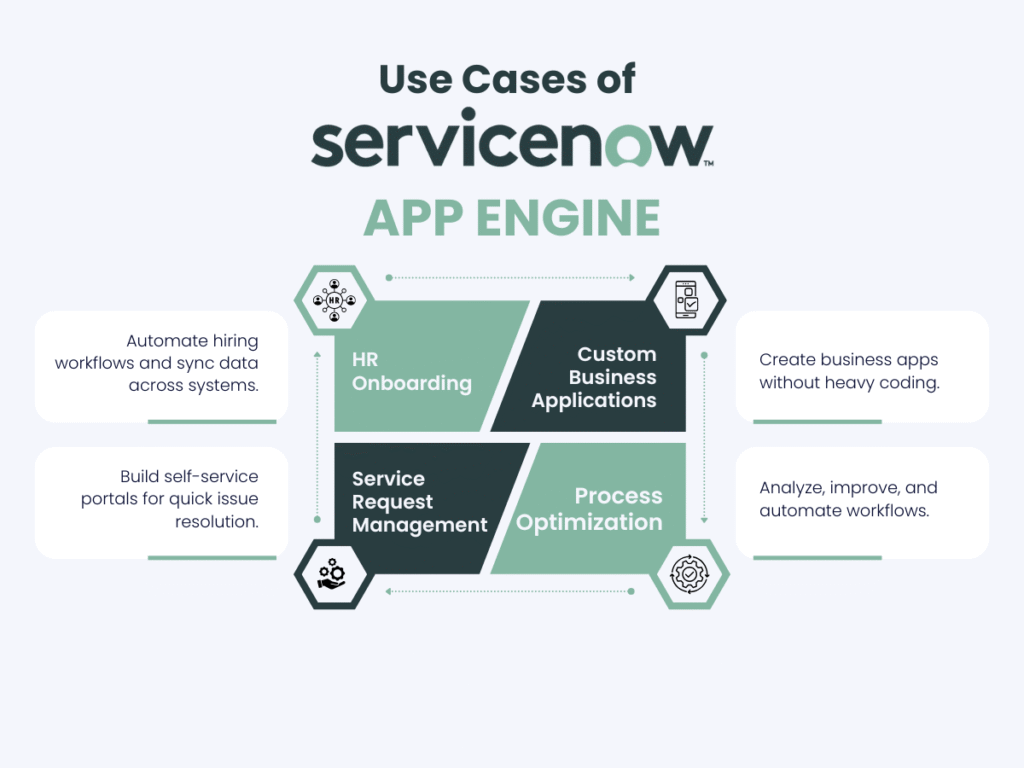ServiceNow App Engine: Powering Faster, Smarter Apps with DevTools
Accelerate app development with ServiceNow App Engine and eliminate process bottlenecks effortlessly. Book your free consultation today!
14 +
Years of Experience
550 +
Happy Customers
250 +
Years of Tech Leadership Exp.

"License Reseller" and "Consulting & Implementation" Partner

TL;DR
- ServiceNow App Engine is a low-code platform that enables teams to build intelligent workflow apps quickly using AI-assisted tools and unified data models.
- It offers visual development environments, automation designers, AI agents, governance controls, and analytics to streamline app creation and optimisation.
- Organizations use App Engine to digitize processes, optimise workflows, and scale innovation safely across HR, IT, operations, and business units.
- DevTools accelerates success with strategic planning, rapid development, governance, integrations, training, and continuous improvement expertise.
Agility is essential for modern businesses. In order to connect data silos, automate manual processes, and provide excellent experiences, business units regularly ask for digital solutions. IT and business executives are irritated by the backlog that results from traditional software development’s inability to keep up. This problem is resolved by ServiceNow’s App Engine, which enables groups to develop and expand apps on a single platform rapidly. App Engine becomes a strategic enabler of enterprise-wide automation when combined with DevTools’ implementation expertise.
This thorough guide describes App Engine’s main features and components, how it operates, its advantages, use cases, best practices, and why companies select App Engine as one of their engines for building low-code/no-code power apps.
What is ServiceNow App Engine?
ServiceNow App Engine is a low-code development platform built on the ServiceNow AI Platform that empowers both developers and citizen developers to design, build, test, and deploy intelligent workflow applications at scale. It provides a unified low-code environment with AI-assisted development tools, App Engine Studio for visual app creation, and a suite of automation features. With its pre-built templates, data modeling capabilities, and intuitive UI design tools, App Engine enables organizations to digitize processes, accelerate innovation, and deliver scalable, secure enterprise applications faster.
Key Components & Features of ServiceNow App Engine
Now Assist for App Engine and Creator
Generative AI is now directly integrated into App Engine through Now Assist for App Engine and Creator ServiceNow. Now Assist for App Engine uses data-driven generative AI and AI agents to help developers create smarter apps that respond to real-time demands. AI is now being used by Assist for Creator to increase productivity throughout the app development process.
AI Agents and Autonomous Workflows
AI agents that can act on their own are part of App Engine. By taking care of repetitive duties like updating records or prioritizing requests, these agents free up human employees to work on more strategic projects.
Development Environments: ServiceNow Studio and Creator Studio
Two user-friendly development environments are offered by ServiceNow Studio and Creator Studio App Engine:
- ServiceNow Studio: Professional developers can create, deploy, and manage apps with ServiceNow Studio, a unified integrated development environment.
- Creator Studio: Creator Studio is a no-code, guided environment where citizen developers can use pre-made templates to create intelligent workflows.
App Engine Management Center
This governance tool enables IT and business to work together to oversee and control the development of low-code apps. It guarantees policy compliance, gives insight into apps in development, and aids in establishing boundaries for citizen development.

Flow Designer and Process Automation Designer
Flow Designer allows users to automate business processes across departments, apps, and systems using drag‑and‑drop flows. Using no-code playbooks, Process Automation Designer simplifies the process of creating and managing intricate workflows.
Process Mining, Predictive Intelligence, and Analytics
App Engine includes tools to analyse and optimise workflows:
- Process Mining identifies bottlenecks and recommends improvements.
- Predictive Intelligence applies machine learning to accelerate routine tasks and predict outcomes.
- Performance Analytics offers real‑time analytics to anticipate and improve outcomes.
Delegated Development and Automated Testing Framework
Delegated development enables developers of all experience levels to create applications for particular projects. Testing is automated by the Automated Testing Framework to lower upgrade risk and accelerate innovation.
How App Engine Works
App Engine makes use of the ServiceNow AI Platform, a unified cloud platform that unifies workflows, data, and AI. To create data models, user interfaces, business rules, and flows, developers and citizen developers utilize either Studio or Creator Studio. By suggesting fields, creating flows, and even writing brief bits of code, AI agents and generative AI tools speed up the design process. The Management Center oversees apps to make sure they comply with corporate guidelines. After deployment, flows connect with other ServiceNow products such as ITSM, ITOM, and HRSD and operate on the platform’s workflow engine.
Key Benefits of ServiceNow App Engine
- Elevate experiences with proactive apps: Use proactive apps to improve user experiences. Teams can create intelligent, data-driven apps that respond to real-time demands with the help of App Engine. These proactive apps increase workflow efficiency and scale systems.
- Scale safely with governance: Use governance to scale safely. Organizations can expand low-code development without losing control thanks to built-in guardrails. Your trusted data serves as the foundation for AI agents, which minimize manual labor and bottlenecks.
- Build smarter and deploy faster: Teams can innovate and launch apps more rapidly when AI tools are available in a unified environment. Automation throughout ServiceNow developer studios is accelerated by centralized metadata management.
- One platform, one data model: App Engine is based on the ServiceNow AI Platform, which offers a single platform and data model for all of its products. This facilitates workflow automation and gets rid of information silos.
- Intelligent automation and workflow capabilities: Users can automate processes without writing code thanks to features like drag-and-drop interfaces, Process Automation Designer, and Flow Designer.
- Role‑based apps: App Engine offers platform owners, developers, business technologists, app delivery leaders, and other stakeholders customized experiences.
Use Cases of ServiceNow App Engine

- HR onboarding: Create a workflow that gathers new hire data, initiates equipment requests, and plans orientation activities to automate the onboarding process. The HR, IT, and financial systems all share the same data thanks to the unified data model.
- Service request management: Create self-service portals so that staff members or clients can report problems or make service requests. Flows connect with IT Service Management (ITSM) and forward requests to the appropriate teams.
- Custom business applications: Without a large team of developers, create custom apps like a field-service scheduling app, compliance management tool, or vendor-onboarding portal.
- Process optimisation: Analyse and enhance current processes using process mining and predictive intelligence, then use Flow Designer to automate them.

Best Practices for Using ServiceNow App Engine
- Start with a solid data model: Reliable workflows are fueled by a clear, well-structured data model. Build upon the ServiceNow Common Service Data Model (CSDM).
- Leverage prebuilt components: Don’t reinvent the wheel. Make use of the ServiceNow Store’s templates, reusable parts, and integrations.
- Define governance early: Set up the App Engine Management Center to enforce coding standards, security policies, and approvals.
- Embrace citizen development responsibly: Provide training and guidelines for business technologists to build simple apps, while allowing professional developers to handle complex logic.
- Iterate and measure: Use performance analytics and process mining to monitor app performance and optimise continuously.
Why Businesses Should Choose ServiceNow App Engine
As App Engine blends speed, intelligence, and control, businesses choose it. It enables teams to produce applications more rapidly without sacrificing governance or quality. It guarantees that every workflow uses the same data model and security architecture since it is based on the ServiceNow AI Platform. Businesses also appreciate that they can use custom apps to expand their current ServiceNow investments (such as ITSM, HRSD, or GRC). ServiceNow claims that integrating App Engine with additional products aids in modernizing manual procedures and streamlining organizational workflows.
How DevTools Helps You Succeed with App Engine
DevTools, your ServiceNow partner, specializes in assisting businesses in realizing ServiceNow App Engine’s full potential. Here’s how:
- Strategic planning and architecture: DevTools collaborates with platform owners and CxOs to comprehend business objectives and convert them into an app and automation roadmap. Their architects select the appropriate combination of ServiceNow products and integrations and create scalable data models.
- Rapid app development: DevTools can prototype and deliver apps in a timely manner while utilizing best practices by utilizing App Engine’s low-code tools. Development is further accelerated by AI assistants such as Copilot and Now Assist.
- Governance and quality assurance: DevTools automates testing and code reviews, creates coding standards, and sets up the App Engine Management Center. App security and compliance are thus guaranteed.
- Integration and automation: DevTools uses Integration Hub and proprietary connectors to integrate ServiceNow with current systems (CRM, ERP, and DevOps toolchains). They also create intricate departmental flows.
- Training and adoption: DevTools facilitates broad adoption by teaching developers and citizen developers how to use Flow Designer, Process Automation Designer, and Studio.
- Continuous improvement: DevTools assists organizations in iterating and optimizing workflows over time by tracking app performance and usage.
Conclusion
In conclusion, ServiceNow App Engine enables businesses to create intelligent and efficient workflow applications. Teams can produce solutions more quickly while keeping control thanks to its AI-powered capabilities, low-code development environments, and governance tools. App Engine offers C-suite executives and IT decision-makers the chance to innovate at scale, streamline operations, and cut down on backlogs.
These advantages are increased when working with DevTools. Their knowledge guarantees that your App Engine deployment adheres to best practices, fits in with your technological environment, and supports your business objectives. You can convert manual procedures into intelligent digital workflows and accomplish quicker, more intelligent results by combining App Engine and DevTools.
FAQs
What is App Engine used for?
On the ServiceNow AI Platform, App Engine enables businesses to rapidly develop and expand workflow applications. It streamlines work by integrating AI agents, automating procedures, and developing unique apps.
Is Google App Engine free?
The App Engine from ServiceNow, which is distinct from Google App Engine, is discussed in this article. The number of users and applications determines the subscription-based pricing for ServiceNow App Engine.
Which languages does App Engine support?
JavaScript and the Flow Designer interface are the main logic tools used by App Engine. Additionally, it facilitates integration through Integration Hub with third-party systems, REST APIs, and SOAP. Non-developers can create workflows without writing code thanks to low-code features.
What’s the difference between App Engine and Compute Engine?
ServiceNow’s low-code app-building platform is called App Engine. Google Cloud’s Compute Engine offers virtual machines for running apps. App Engine concentrates on creating workflow apps inside the ServiceNow ecosystem, even though both speed up development.

Pramodh Kumar M is a Solutions Architect at DevTools with over 6 years of specialized experience in DevSecOps and enterprise IT solutions. He holds multiple advanced certifications, including Certified Kubernetes Security Specialist (CKS), GitHub Advanced Security, and Azure Solutions Architect Expert. Pramodh specializes in Agile, Cloud & DevOps toolchain implementations, with extensive hands-on experience helping enterprises with digital transformation initiatives. His expertise extends to ServiceNow implementation and support. He is passionate about sharing practical insights on Cloud, DevOps, Automation, and modern IT operations.




